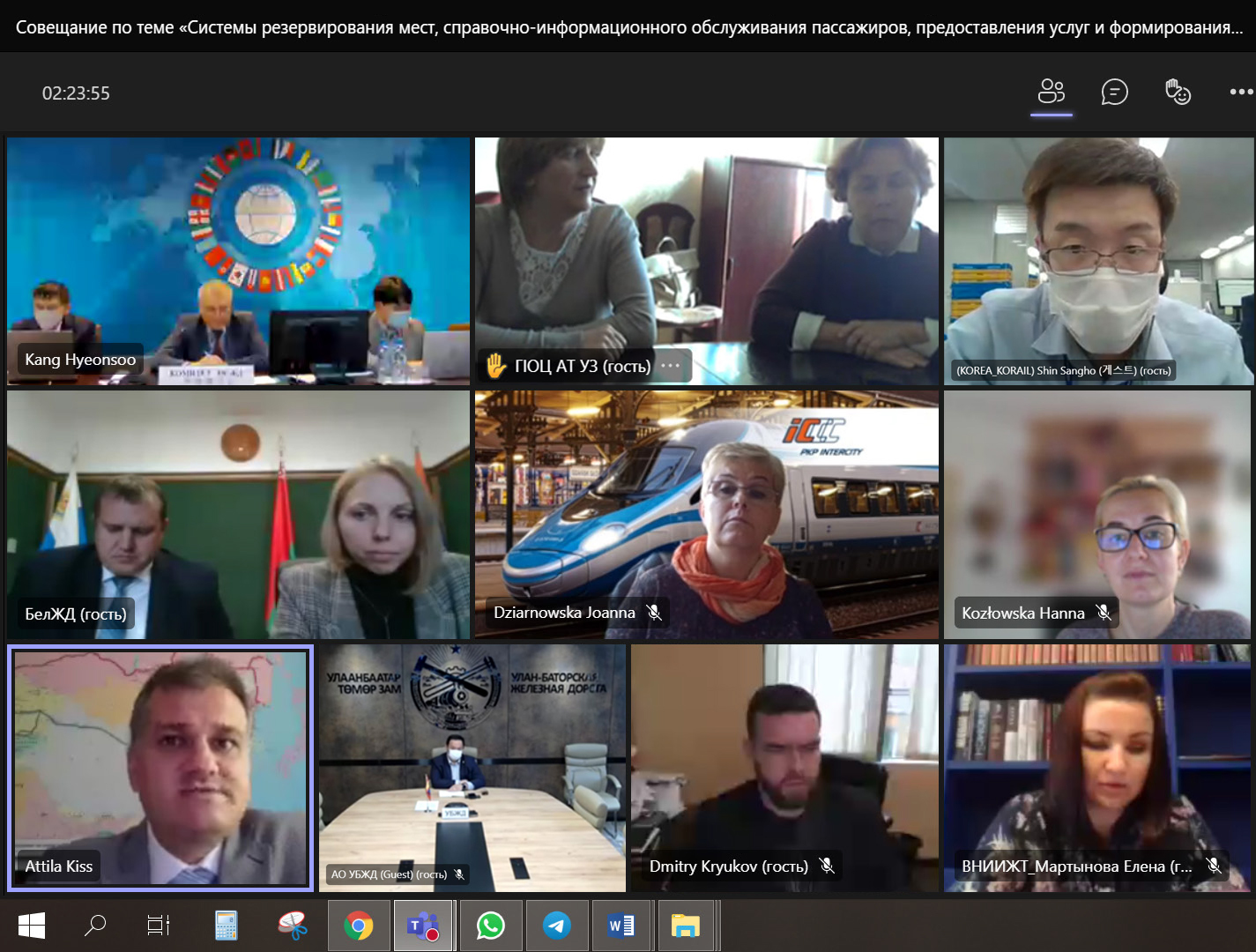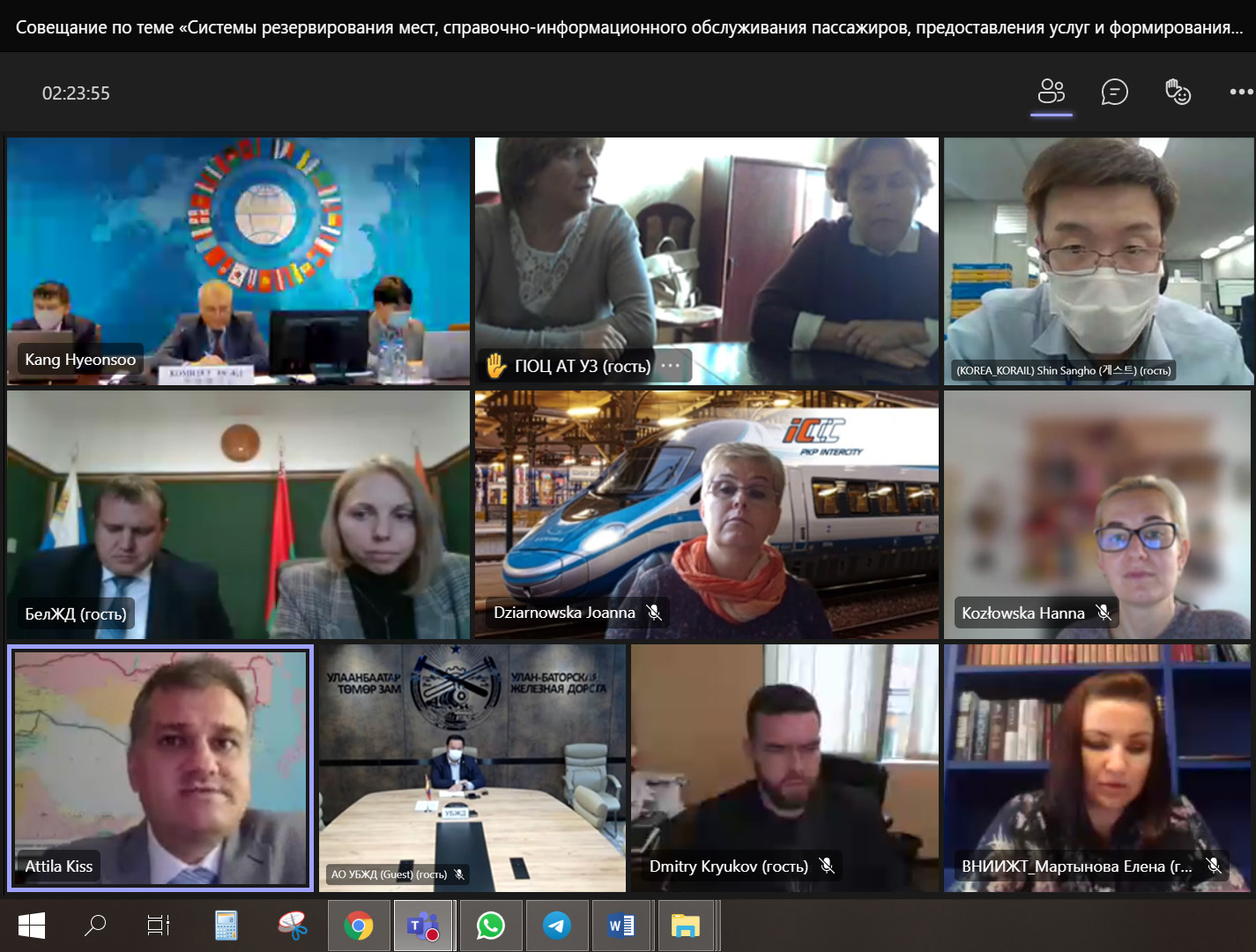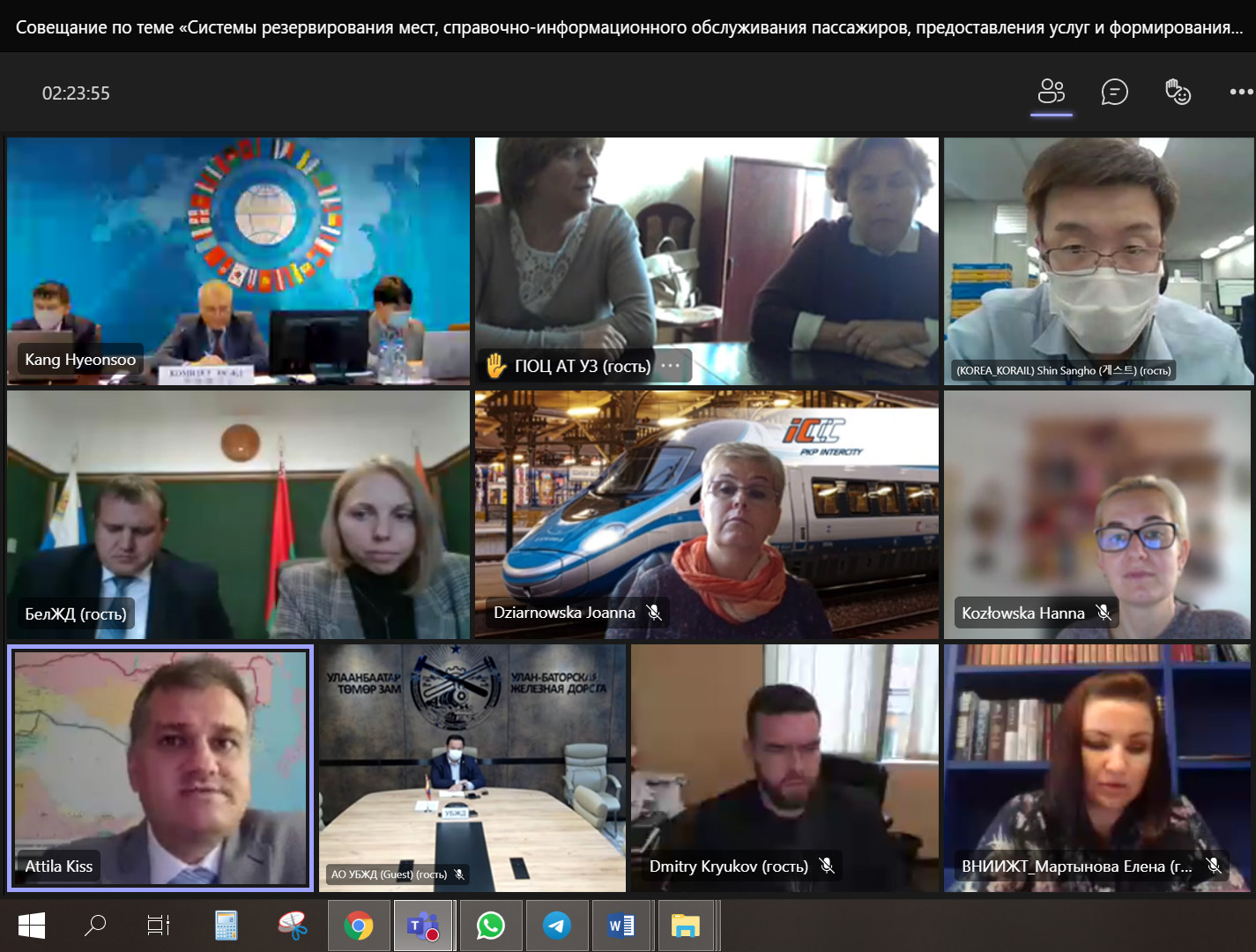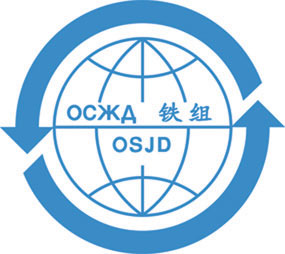Meeting of railway experts on the subject “Systems used for making seat reservations, providing passenger information and other passenger services, and for the preparation of financial accounting documents”



The meeting was organised by the OSJD Committee, Warsaw, as an online videoconference and held on 28-30 September 2021 as required by the Work Plan of the OSJD Commission on Passenger Traffic for 2021.
The meeting attendees represented AZD CJSC, BC, MAV Co., KZH, KORAIL, KRG, LDZ, CFM, UBZD JSC, PKP JSC, RZD OJSC, UTI, UZ, and the OSJD Committee.
The meeting reviewed the following issues:
- upgrades to electronic systems to provide better services, including information services, to passengers; and improvement of passenger traffic management technologies;
- modification of reservation systems to meet the updates to the relevant OSJD/UIC Leaf- lets;
- XML message-based information exchange between reservation systems;
- upgrades to the UZ’s Automated Passenger Transport Control System, the objectives to include, among others, scaling up sales of electronic international travel documents.
The meeting considered the presentations made by BC, RZD OJSC, PKP JSC that addressed the issues of improving electronic reservation systems, providing information and directory service to passengers, and improving passenger transport management technologies.
The Byelorussian Railway updated the participants on the development of its electronic systems used to improve passenger services and provide information to passengers, as well as on the steps taken to upgrade the Byelorussian Railway’s passenger transport management technologies.
The growing share of electronic travel documents in the total sales of both numbered and unnumbered seats was noted.
The Travel Document Online Sales System had been augmented with the functionality of graphic representation of the layout of the units forming the Minsk – Moscow “Lastochka” EMU operated by the FPC JSC. The layouts are available in the Passenger Services section of BC’s official website, and can also be accessed with the BC. My Train mobile application. This functionality can be used to generate graphics representing the layouts of any non-BC coaches except non-standard ones.
The software powering the Express-3 Automated Control System was upgraded to allow electronic check-in with the Automated Passenger Transport Management System for train journeys within the Republic of Belarus. Electronically checked-in electronic travel documents for trains covered by the system may be returned within one hour of the train’s departure from the passenger’s boarding station. Further upgrades to the online travel document sales system are planned in order to expand the electronic check-in functionality to cover international trains.
The BC and PKP experts jointly conducted a set of tests of the interoperability between the Express-3 ACS and EPA-PKP automated systems to ascertain that the systems can issue travel documents to trains:
- Nos. 127/128 and 125/126 Brest – Warsaw,
- Nos. 727/728 and 725/726 Minsk – Brest,
- 303/304 Grodno – Kraków.
Reservations in the EPA-PKP system made out of the set of seats stored in the Express-3 ACS were successful, with PKP experts demonstrating the system’s proper functioning in issuing travel documents.
The Express-3 ACS was updated to allow the system to obtain information on the availability of seats out of the set allocated to the EPA-PKP, and to make reservations of travel documents to the above trains. Additional tests were conducted, as well as verifications of the settlement sheet generation functionality.
Ensuring proper interoperability between the Express-3 ACS and EPA-PKP reservation systems will make possible the next step: opening of electronic ticket sales and electronic check-in.
BC and UZ signed an Agreement on Coordination in the Organisation of Electronic Check-In Procedures for Passengers of International Trains Operating between the Republic of Belarus and Ukraine. The introduction of travel documents supporting electronic check-in will make international passenger transport by rail significantly more attractive after the restrictions imposed in response to the spread of the coronavirus infection are lifted and passenger traffic resumes between the Republic of Belarus and Ukraine.
The RZD OJSC delivered a presentation on the topic “New-generation systems in passenger operations.” The systems are designed to address both the domestic needs of the Russian Federation and the needs of integration into the Express International system. RZD also delivered a second presentation entitled “On new services offered to passengers.” The meeting participants noted the interest among the OSJD representatives to developing and expanding the Express International system with a view to its possible integration with information systems of OSJD member countries.
In order to identify common needs and build effective integrations between information processing systems of OSJD member countries, the RZD OJSC has invited representatives of OSJD member countries to join the efforts led by the Express International Project Office.
In view of the current unfavorable epidemiological situation that includes the discontinuation of international passenger trains (except the traffic between the Russian Federation and the Republic of Belarus that was resumed in February 2021), and in order to attract passengers to domestic trains, the RZD OJSC introduced a number of new services into the Express-3 ACS that were offered to the passengers of FPC JSC’s intercity trains in 2021, as follows:
- new multimodal routes, the launch of new trains, including high-speed ones on the Moscow-Minsk line;
- marketing campaigns aimed to highlight the passenger safety aspect of traveling by rail, new rate-related products such as promo codes and discount cards allowing to buy journeys at a discount;
- new passenger boarding technologies requiring only the passengers’ IDs without the need to produce a travel document;
- extending the line of RZD OJSC’s tourist- oriented products, and the launch of cruise trains.
The PKP JSC delivered a presentation on the subject “PKP Intercity Mobile Application”.
The application is the company’s response to a change of preferences among PKP passengers toward a more frequent use of their smartphones to buy PKP products. The application can be used not only to buy tickets, but also to organise the entire journey. The post-sale processes are also facilitated in the sense that, following a purchase of a ticket, the user can manage it, i.e. change or return it, or change the passenger data in the ticket. For frequent routes, the user can create a journey profile to reduce the time needed to buy a ticket. The application can also be used to order meals during the journey. At the initial stage, the application supports only domestic journeys, with international routes to be added later on.
The KTZ NC JSC (KZH) informed the meeting that a number of steps had been taken to improve the quality and extend the range of services provided to passengers.
The electronic discount card Meyirim had been introduced to passengers with various categories of disability that grants access to privileged travel documents (tickets) to socially important trains at a 50% discount. The discount card is personalised and issued to the passenger at a booking office against documents validating the right to the privilege, so only the rightful card owner can obtain tickets at a discount. The card can be issued to both adults and children, in the latter case, the discount is applied to the child fare. The discount card allows persons with disabilities to purchase privileged railway tickets through all sales channels available, including distance channels that do not require the buyer to leave their home.
The “ladies only” coaches have been put in commercial operation, tickets to which can be issued only to female passengers and male children under the age of seven. The attribute “ladies only” is assigned by the carrier to certain coaches and stays on for the entire route of the journey.
The sex of a passenger is verified at the time of the ticket’s issue.
In response to multiple requests received from passengers, boarding passes for completed journeys have been made available to passengers at the official website bilet.railways.kz, and via the mobile app. If evidence of a journey is needed (business trips, reimbursements, court cases, etc.), owners of electronic tickets can obtain a copy of the boarding pass associated with their tickets after logging in to their personal accounts at any time after their boarding has been recorded by the coach attendant.
The meeting emphasised the importance of continuing those lines of work in order to improve the competitive standing of international passenger railway services.
The meeting discussed a range of issues associated with updating Joint OSJD/UIC Leaflets and applying their provisions to seat reservation systems.
Due to the transition to the OSDM platform as the replacement of the PRI- FIS (an information processing system designed to support tariff data exchange in the UIC’s 108-1 document format) and the introduction of the new OSDM tariff data format, the UIC Passenger Department is preparing a new document (IRS 90918 10) that will define the railway ticket tariff data exchange structure.
The meeting also discussed aspects of information exchange between reservation systems based on XML messages, and emphasised the need to engage a UIC representative to clarify the procedure for the use of the HEROS translator in cases where reservation systems communicate via VPN HERMES using the XML protocol.
The “Ukrzaliznytsia” JSC informed the meeting of the growing popularity of its ticketing service that does not require a visit to the booking office. Over eight months of 2021, electronic channels were used to purchase 72% of the total sales of travel documents.
In 2021, UZ collaborated with Visa and Middleware to launch its first-ever own chatbot in Viber and Telegram that can be used to buy tickets directly from the railway, order meals during a journey, review the timetable, return purchased tickets; get notifications of arrival, delays, track numbers. The chatbot can also be used to buy tickets at adult of child fares, or obtain a privileged electronic travel document available to school and college students. Currently, electronic travel documents for high-speed Intercity+ trains can be issued via the chatbot.
To validate electronic tickets bought via the chatbot, an Android mobile app has been developed that is used to verify electronic travel documents on Intercity+ trains. A tender is in progress to procure Android-based ETD verification devices that would enable the chatbot to issue electronic tickets to all Ukrzaliznytsia trains.
The development of a new application is underway that would enable the user to buy tickets. The app will also afford the convenience of using one’s personal gadget to order train tickets or travel-related services. The application will be available for gadgets running on both Android and iOS.
On domestic lines, travel documents for trains operated by the subsidiary UZSK can cover additional services such as Meat Lunch, Vegetarian Lunch, or Kids’ Lunchbox, with payments for these services accepted both at booking offices and online.
Issue of electronic travel documents has been implemented with regard to all UZ trains and coaches running between Ukraine and Poland based on a bilateral Agreement between UZ and PKP Intercity on the organisation of sales of electronic documents paid for via the Internet.
Currently, international passenger traffic also includes two UZ coaches operated on the Kiev – Budapest – Vienna route, with tickets available at booking offices of UZ, MAV, and ÖBB. On 10 October, the Kiev – Przemyśl international link between Ukraine and Poland was reestablished. The line is served by Hyundai high-speed trains.
